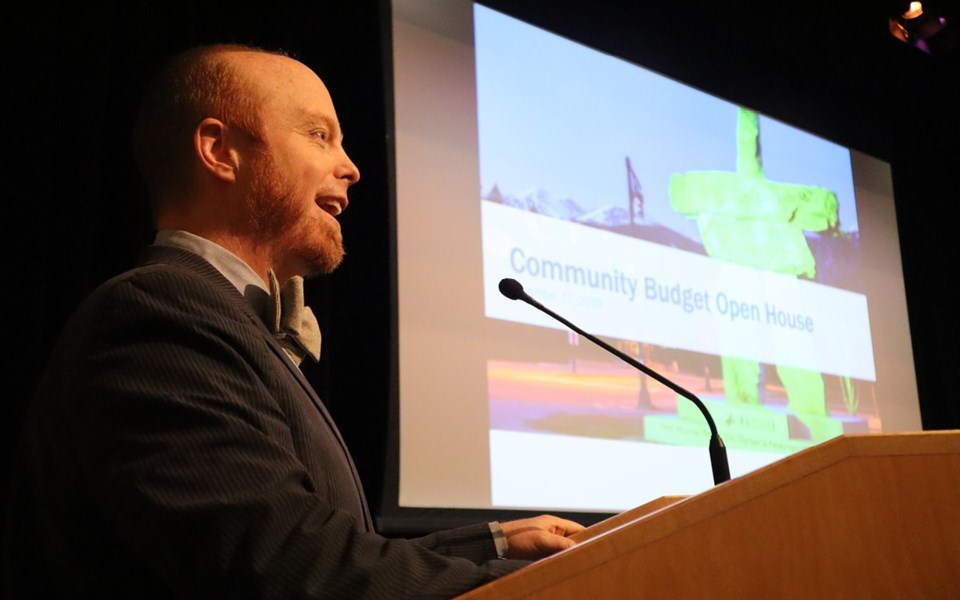Whistlerites with burning questions about the municipal budget—and the exact scope of the COVID-sized hole in the middle of it—will have a chance to learn more at a budget open house on Monday, Nov. 16.
The meeting will kick off at 5:30 p.m. over Zoom (due to COVID).
“Following the presentation, community members will be able to ask questions of staff and council, and there will be breakout rooms in Zoom to further discuss what was presented and ask questions,” said Mayor Jack Crompton at the Nov. 3 council meeting. “COVID has had a significant impact on municipal finances, as I’m sure you’d expect. I highly encourage everyone to join the open house to learn more.”
Video of the event and related materials will be posted to whistler.ca/budgetopenhouse after Nov. 16.
As for if the community can expect a shift in spending priorities in light of COVID, Crompton said he’d like to hear from residents.
“One of the reasons that we engage in a public budget process is so that we can gain input to guide decisions,” he said after the meeting. “Council’s priorities are housing, climate action and community balance, so I expect you’ll see investments in those directions.”
There will also be a focus on asset replacement and maintaining a strong reserve balance, Crompton added, which leads to what is perhaps the hottest-burning question of all: how will COVID affect your taxes?
It’s too early to say, the mayor said, but that info is (tentatively) scheduled to come before council on Dec. 1.
Read more about Whistler’s budgeting process at whistler.ca/budget.
CLEANBC APPLICATION SUPPORTED
The Resort Municipality of Whistler, District of Squamish, Village of Pemberton and Lil’wat Nation are collaborating to expand the availability of electric vehicle charging stations in the Sea to Sky corridor.
The four corridor communities are working on a group submission to the province’s CleanBC Communities Fund to help pay for 43 new EV stations over the next four years—24 of which would be in Whistler.
On Nov. 3, Whistler council directed staff to submit an application to the fund for 73.3 per cent of the total project costs.
A second resolution passed by council commits the RMOW to paying a maximum of $544,934 for its share of the project over four years (if the CleanBC application is successful) from its capital reserves.
The project is designed to address gaps in the public EV charging network in the Sea to Sky corridor, said climate action coordinator Luisa Burhenne in a presentation to council.
Whistler currently has about 40 public EV chargers, including 26 Level 2 EV chargers in the Day Lots, which represent about 1.5 per cent of summer parking and one per cent of winter parking.
With EV adoption already trending higher than required by B.C.’s zero emission vehicle mandate (that 15 per cent of new vehicle sales are EV by 2025, 30 per cent by 2030 and 100 per cent by 2040), a lack of adequate charging may soon become a real hurdle, Burhenne said.
Of the 43 proposed new chargers, 28 would be dual-port Level 2, and 15 would be Level 3 (16 and eight in Whistler, respectively).
The mix was recommended by stakeholders, Burhenne said, noting that Level 2 chargers can recharge a car in about five to eight hours—a good fit for the Day Lots (though there is flexibility around where the new chargers are installed, Burhenne said).
Level 3 chargers, which can charge a car in 20 to 60 minutes, are better located near highways, convenience stores or coffee shops, she said.
Factoring in maintenance, electrical services and snow removal costs, the new infrastructure comes with estimated annual operation costs of about $56,400, Burhenne noted.
A resolution introduced by Councillor Cathy Jewett will compel Burhenne to return to council at a later date with another report looking at cost recovery options for the maintenance and installation of the infrastructure.
It would be “very simple” to install a cost structure on the new charging machines, Burhenne said, noting that municipal staff can customize the fee charged to use the machines.
Coun. Ralph Forsyth voted against, positing that the provincial funding won’t be in place forever, and that the proposal from Burhenne was rushed to meet a Nov. 12 deadline.
“This isn’t the business we should be in,” he said. “Even if it was our business, I’m not sure that this is a great deal for our taxpayers, and I’m not sure that it’s ready for primetime.”




